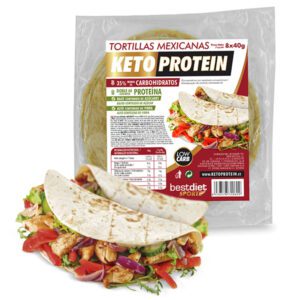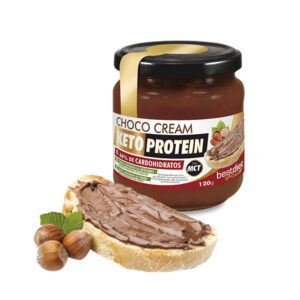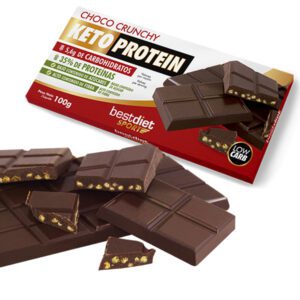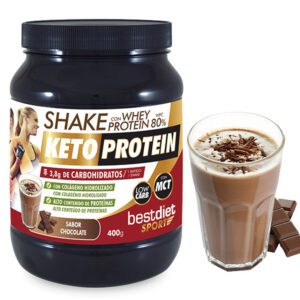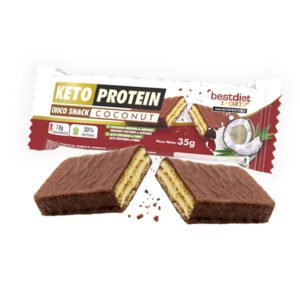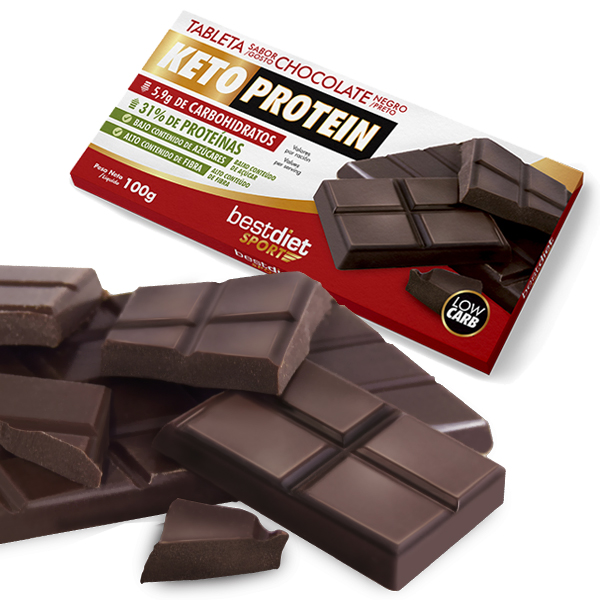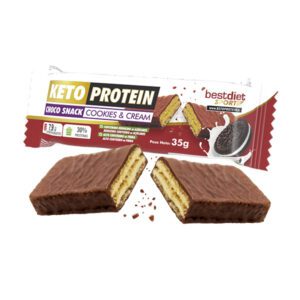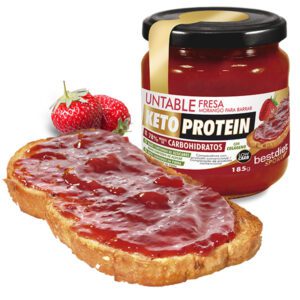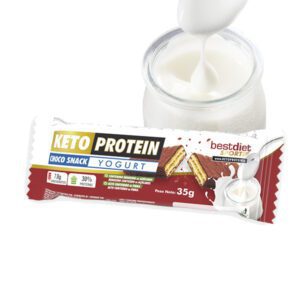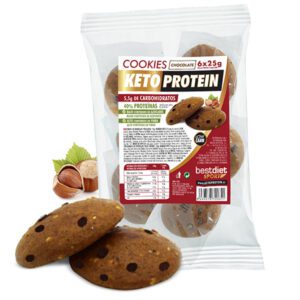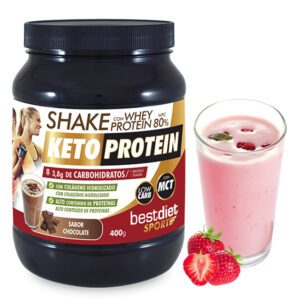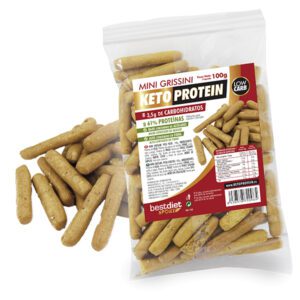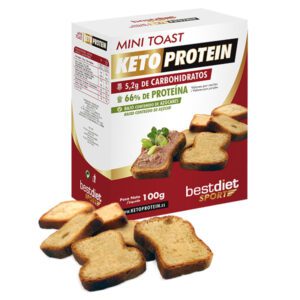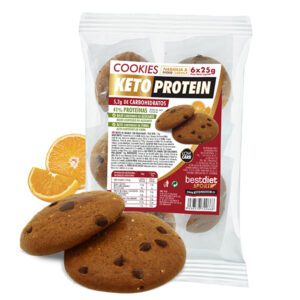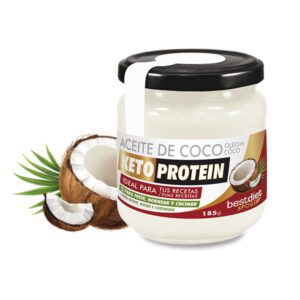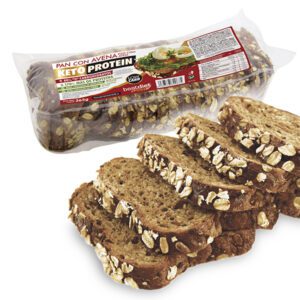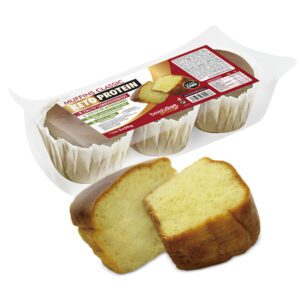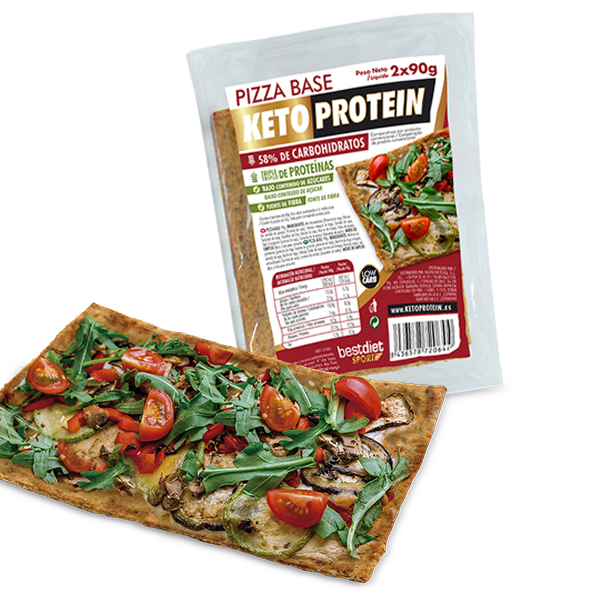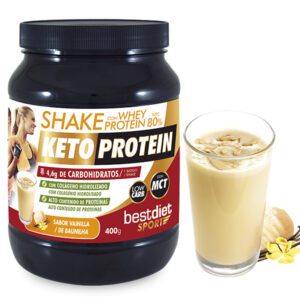Haz click aquí y consigue un 10% de descuento en tu primera compra.
10% de DESCUENTO en tu primera compra. Click aquí
KETO PROTEIN
KETO PROTEIN
KETO PROTEIN es la línea de productos de alimentación de BESTDIET. Se posiciona en gran consumo con el objetivo de convertirse en la marca de referencia para aquellos que quieren cuidarse a través de una alimentación rica en proteínas y baja en hidratos de carbono.
BESTDIET es la marca española de complementos alimenticios y alimentación especial que se caracteriza por desarrollar sus propios productos con un claro enfoque hacia las nuevas tendencias y las exigencias de un consumidor que desea cuidarse sin renunciar a las sensaciones y los sabores de los productos que le gusta y a los que está acostumbrado.
Se trata de una marca orientada a las nuevas demandas del mercado que crea tendencia gracias al compromiso de un equipo multidisciplinar con una larga trayectoria profesional en la materia.
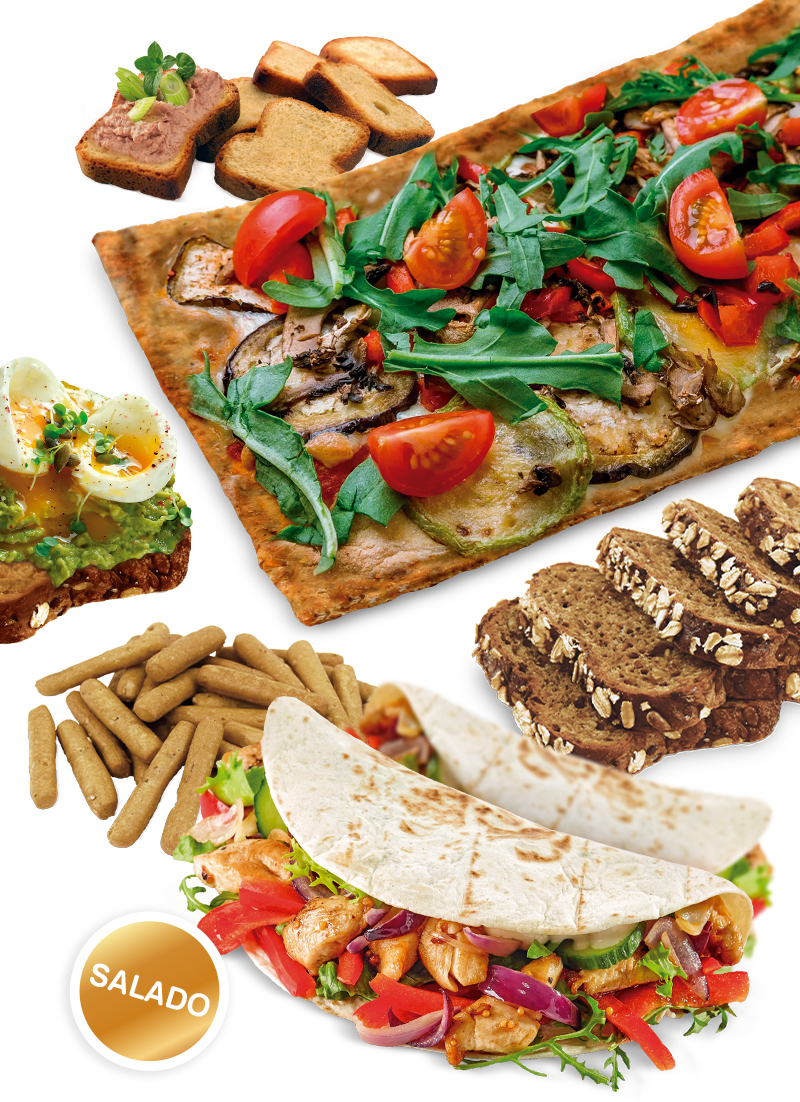
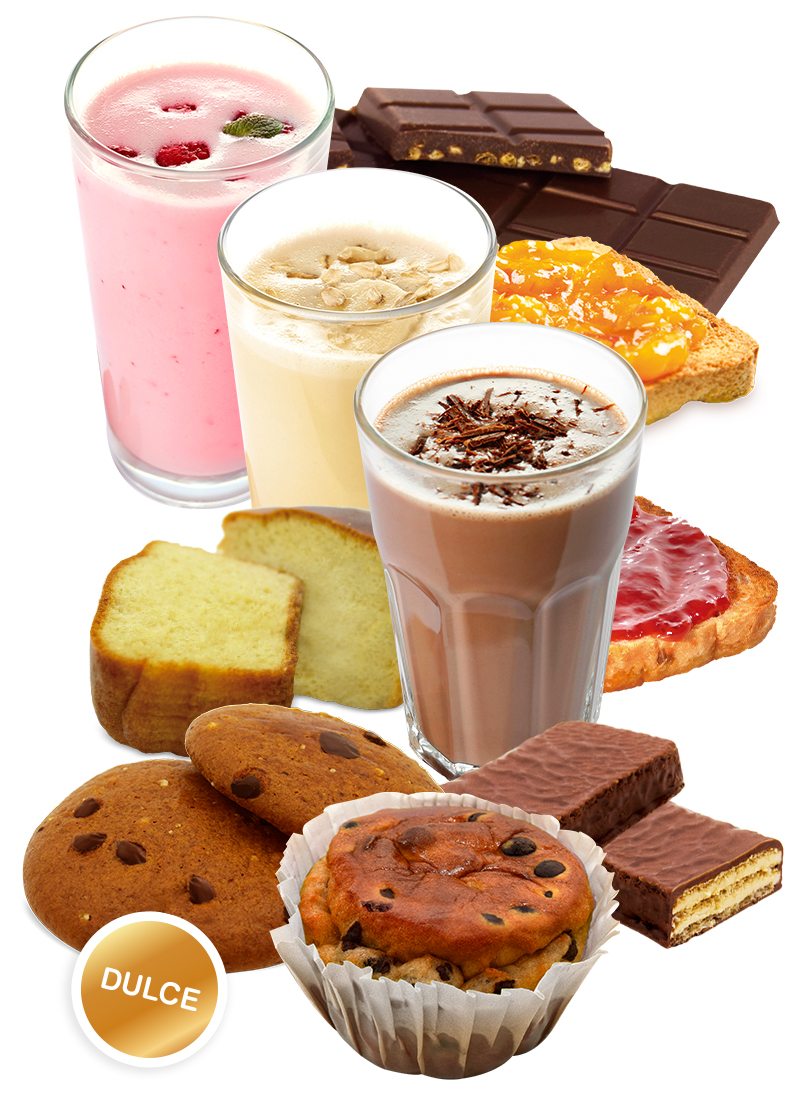
Después de una década de trabajo dedicado a la investigación y desarrollo de cientos de referencias diseñadas para distintas marcas, presentamos nuestra última creación, la familia de alimentación KETO PROTEIN. La principal característica de esta línea es su alto nivel de proteínas y su bajo contenido en hidratos de carbono y grasas. Hemos cuidado con especial mimo la calidad organoléptica: las sensaciones, la textura, el sabor y por supuesto, su bajo contenido calórico respecto al producto tradicional, marcando una diferencia sustancial respecto a la oferta actual.
Existe una tendencia global creciente en el mercado de la dietética y nutrición deportiva que nos lleva a una evolución del consumo donde prevalecen los alimentos con un alto porcentaje de proteínas y bajos niveles calóricos, asociados a un reducido contenido de hidratos de carbono y grasas. Esto, unido a un consumidor más informado sobre los valores nutricionales y sus efectos sobre la salud, nos ha conducido al desarrollo de la nueva línea Keto Protein.
No estamos hablando de ninguna dieta en concreto, Keto Protein se dirige al consumidor que se cuida, que está preocupado por su alimentación y por la de su familia, que desea tener una amplia oferta donde elegir sin renunciar al sabor, por su salud, por el bienestar en cualquier momento de su vida. La gama de productos satisface una demanda creciente de un perfil de consumidor, que no solo quiere disfrutar con la comida sino también saber que con ello se está cuidando y está cuidando de los suyos.
“ALTO CONTENIDO EN PROTEÍNAS”: hemos desarrollado una gama de productos con un nivel de proteínas muy superior al habitual si lo comparamos con productos convencionales similares de referencia en el mercado, sin alterar sus características organolépticas, enfocados hacia aquellos que buscan incorporar a su dieta un aporte extra de proteínas
“BAJO CONTENIDO EN HIDRATOS DE CARBONO”: en la gama KETO PROTEIN hemos reducido de una forma considerable el contenido de Hidratos de Carbono respecto a los productos convencionales similares de referencia en el mercado, sin renunciar al sabor, pero satisfaciendo la demanda de aquel consumidor preocupado por su alimentación y su bienestar.
Con Keto Protein facilitamos el camino hacia una reeducación alimentaria orientada hacia nuevos hábitos de alimentación más saludables. No sólo contribuiremos a conseguir una pérdida de peso eficaz sino un mantenimiento en el tiempo a través de una alimentación equilibrada. “Cambiar los hábitos de alimentación es fundamental, si queremos mantener los resultados obtenidos”.
Si te encuentras en un peso óptimo y saludable, se trata de conservarlo. Perder peso es relativamente fácil, pero conservar el peso es más difícil. Ahora podrás comer de todo, pero siempre manteniendo una alimentación equilibrada. “En la alimentación, los milagros no existen; una alimentación equilibrada es la única solución”. Proponerte buenos hábitos, como son, primar el consumo de Verduras y Frutas a lo largo del día (5 raciones diarias), orientar a que la mayor carga calórica se realice en las primeras comidas del día y hacer una menor carga calórica al final del día, hacer una distribución regular de proteínas a lo largo del día, para mantener la masa muscular, es importante.
- Sensación de bienestar y de ausencia de fatiga; efecto estimulante.
- Protección de la masa muscular, gracias al aporte de proteínas de forma regular, favoreciendo la tonificación de tu silueta.
- Pérdida de peso regular y progresiva facilitando su estabilidad a largo plazo.
- Aporte de proteínas de calidad, con la ventaja de que son fáciles de consumir.
- Variedad de sabores y texturas que harán que tu dieta resulte más agradable y fácil de llevar.
- Mantenimiento del peso, de manera duradera a través de una alimentación equilibrada.
- Con sobrepeso u obesidad.
- Que deseen prevenir y disminuir las complicaciones vinculadas al sobrepeso: trastornos, cardiovasculares, respiratorios (insuficiencia o apnea del sueño), articulares…
- Que han tenido un aumento de peso tras dejar de fumar, tras el embarazo, debido a la menopausia.
- Que desean mejorar o mantener su aspecto estético.
Nota: Tener un peso mayor al saludable puede ocasionar la aparición de muchas enfermedades; cardiovasculares (hipertensión, colesterol), problemas respiratorios (insuficiencia, apneas), diabetes, problemas articulares. Provoca un estado de ánimo negativo y una baja vitalidad. Al perder peso recuperamos la salud, el bienestar y la imagen que deseamos tener.
Estilo de Vida Saludable
--------------------------------------------------------
Dieta o Mantenimiento
----------------------------------------------------
Increíble Sabor
------------------------------------
Deporte / Musculación
----------------------------------------------------
DIFERENCIA ENTRE DIETAS

Se reducen proporcionalmente los porcentajes de macronutrientes (hidratos, grasas y proteínas) que en una dieta mediterránea o equilibrada; para conseguir bajar la cantidad de calorías consumidas diariamente, buscando con ello lógicamente una pérdida de peso.
El aporte de Proteínas en este caso es insuficiente para mantener la masa muscular. Se baja peso; grasa acumulada, pero también se pierde masa muscular en un porcentaje alto.
La pérdida de masa muscular provocará que el Metabolismo Basal haya descendido al terminar la dieta; la consecuencia será que nuestro cuerpo necesitara menos energía (calorías) que cuando empezamos la dieta. Una vez volvamos a nuestra alimentación habitual y sobre todo si no hemos cambiado nuestros hábitos alimenticios (en favor de una alimentación equilibrada) puede provocar un aumento del peso perdido, debida a esta bajada del Metabolismo Basal.
*Notas: Metabolismo Basal: es el valor mínimo de energía necesaria para que nuestro cuerpo subsista. Esta energía mínima es utilizada para la realización de funciones metabólicas esenciales, como es el caso de la respiración. La tasa metabólica disminuye con la edad y con la pérdida de masa muscular. El aumento de la masa muscular es lo único que puede incrementar esta tasa.
- Perdida de peso
- Proteína Necesaria
- Masa muscular

La dieta KETO PROTEIN, no es una dieta hiperproteica, ni una dieta hipocalórica.
Las dietas hiperproteicas incrementan excesivamente la ingestión de proteínas; por lo que pueden llegar a sobrecargar el metabolismo. Las dietas hipocalóricas reducen tanto la ingestión de grasas y azúcares, como de proteínas, lo que dificulta que el organismo mantenga sus necesidades vitales con normalidad y hace que se pierda masa muscular.
La Dieta Proteica reduce la ingesta de grasas y azúcares, pero aportando la cantidad de proteínas necesaria para el funcionamiento del organismo; permitiendo que la pérdida de peso se realice a expensas de la masa grasa y manteniendo la masa muscular o que la perdida de esta sea mínima.
- Perdida de peso
- Proteína Necesaria
- Masa muscular

Se reducen el consumo de hidratos de carbono (pan, pasta, arroz, patatas…etc.) a favor de aumentar la cantidad de Alimentos ricos en Proteínas, pero tampoco se restringen o reducen el consumo de grasas.
Además los Alimentos ricos en Proteínas que se suelen consumir, son ricos en grasas saturadas. Esto provoca un aumento del colesterol y de los triglicéridos (con el consiguiente riesgo cardiovascular). En este tipo de dieta también hay un aumento del ácido úrico (con el consiguiente riesgo de problemas como cálculos renales y gota [cristales de ácido úrico en las articulaciones])
En definitiva, es una dieta totalmente desaconsejable.
- Perdida de peso
- Proteína Necesaria
- Masa muscular
La rutina alimentaria KETO PROTEIN está centrada en la reeducación alimentaria y en el mantenimiento de una alimentación equilibrada. Las personas que adquieren nuevos hábitos alimentarios lo tienen fácil al poder contar con gran variedad de productos que le ayudarán a mantener el peso a largo plazo.
La Cetosis inducida por la Dieta Proteica no debe confundirse nunca con la Cetoacidosis. La Cetoacidosis es una situación grave (por ejemplo en los pacientes diabéticos tipo 1).
En este caso, los niveles de glucosa (azúcar en sangre) son elevados, pero como el organismo no puede utilizar esa glucosa porque existe un déficit de insulina, se generan cuerpos cetónicos de forma rápida e incontrolada. Esta masiva producción de cuerpos cetónicos crea importantes desequilibrios y conduce a una situación crítica, como el descenso del pH sanguíneo, la desmineralización y la deshidratación grave.
En la Dieta Proteica la Cetosis que se induce es controlada; en esta dieta se aporta un mínimo de 50 g de carbohidratos por día, lo cual hace disminuir la cetosis y mantenerla controlada.
Este aporte de hidratos en la dieta es importante además por otras razones: disminuyen la sensación de hambre, mejoran el humor, impiden la disminución del metabolismo basal, aumentan la capacidad física, favorecen la retención de electrolitos (minerales), inhiben la hiperuricemia (ácido úrico), disminuyen la pérdida de minerales tan importantes como son calcio, magnesio y zinc.
- Una vez conseguido tu peso ideal el reto es mantenerse.
Gracias a nuestra RUTINA ALIMENTARIA (basada en la dieta proteica) adquirirás nuevos hábitos alimenticios, que te ayudarán a mantenerte en tu peso ideal. Nuestro objetivo es la reeducación alimentaria.
BLOG
RECETAS
LOW CARB

Pierde peso y gana masa muscular. Entra en el enlace para conocer recetas de cocina saludable.
Te ayudamos a conseguir un estilo de vida saludable, sentirte bien contigo mismo, y favorecer tu bienestar mejorando tu alimentación.


